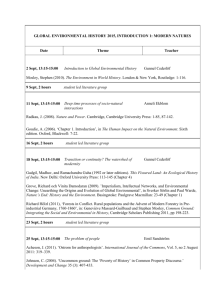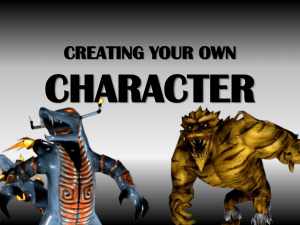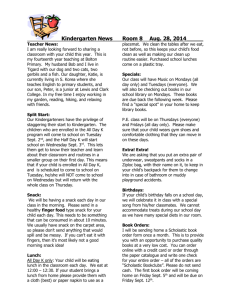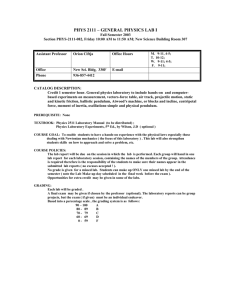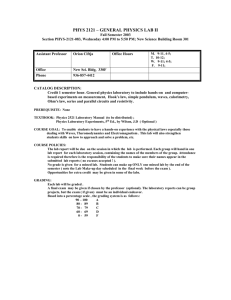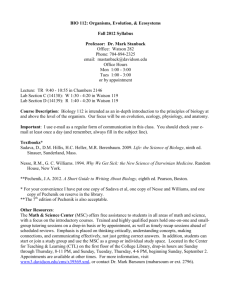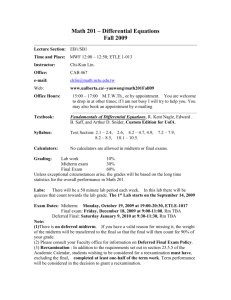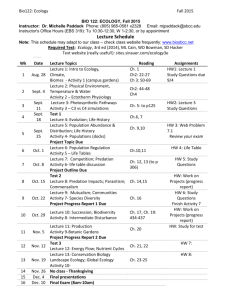course curriculum
advertisement
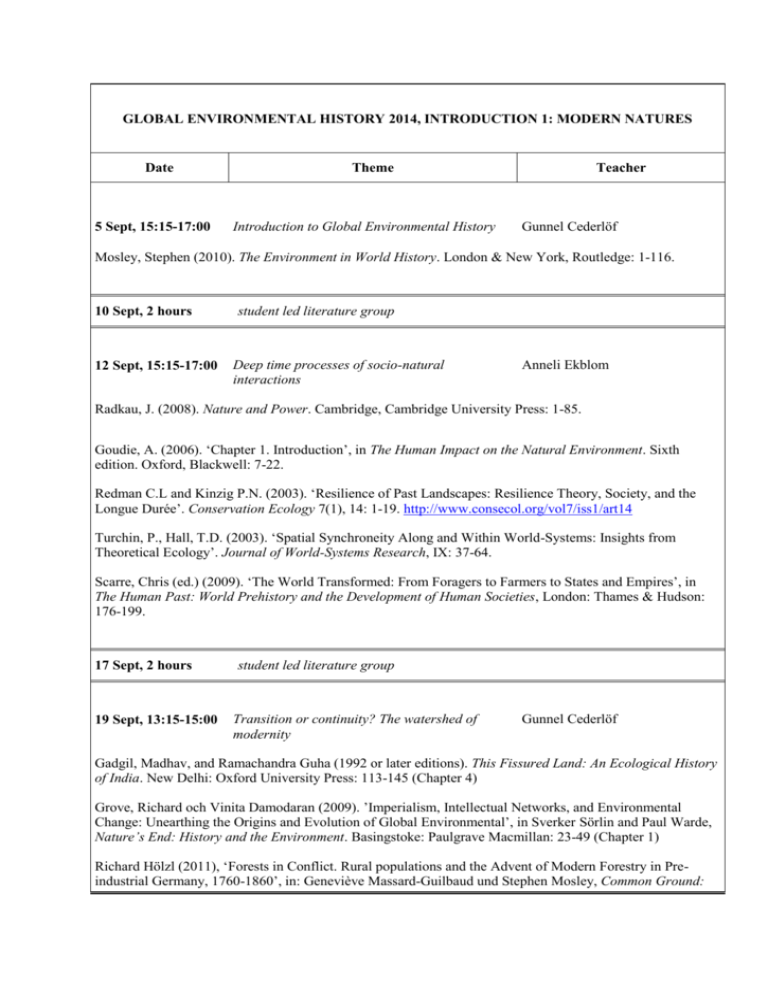
GLOBAL ENVIRONMENTAL HISTORY 2014, INTRODUCTION 1: MODERN NATURES Date 5 Sept, 15:15-17:00 Theme Introduction to Global Environmental History Teacher Gunnel Cederlöf Mosley, Stephen (2010). The Environment in World History. London & New York, Routledge: 1-116. 10 Sept, 2 hours 12 Sept, 15:15-17:00 student led literature group Deep time processes of socio-natural interactions Anneli Ekblom Radkau, J. (2008). Nature and Power. Cambridge, Cambridge University Press: 1-85. Goudie, A. (2006). ‘Chapter 1. Introduction’, in The Human Impact on the Natural Environment. Sixth edition. Oxford, Blackwell: 7-22. Redman C.L and Kinzig P.N. (2003). ‘Resilience of Past Landscapes: Resilience Theory, Society, and the Longue Durée’. Conservation Ecology 7(1), 14: 1-19. http://www.consecol.org/vol7/iss1/art14 Turchin, P., Hall, T.D. (2003). ‘Spatial Synchroneity Along and Within World-Systems: Insights from Theoretical Ecology’. Journal of World-Systems Research, IX: 37-64. Scarre, Chris (ed.) (2009). ‘The World Transformed: From Foragers to Farmers to States and Empires’, in The Human Past: World Prehistory and the Development of Human Societies, London: Thames & Hudson: 176-199. 17 Sept, 2 hours 19 Sept, 13:15-15:00 student led literature group Transition or continuity? The watershed of modernity Gunnel Cederlöf Gadgil, Madhav, and Ramachandra Guha (1992 or later editions). This Fissured Land: An Ecological History of India. New Delhi: Oxford University Press: 113-145 (Chapter 4) Grove, Richard och Vinita Damodaran (2009). ’Imperialism, Intellectual Networks, and Environmental Change: Unearthing the Origins and Evolution of Global Environmental’, in Sverker Sörlin and Paul Warde, Nature’s End: History and the Environment. Basingstoke: Paulgrave Macmillan: 23-49 (Chapter 1) Richard Hölzl (2011), ‘Forests in Conflict. Rural populations and the Advent of Modern Forestry in Preindustrial Germany, 1760-1860’, in: Geneviève Massard-Guilbaud und Stephen Mosley, Common Ground: Integrating the Social and Environmental in History, Cambridge Scholars Publishing 2011, pp 198-223. 24 Sept, 2 hours 26 Sept, 15:15-17:00 student led literature group The problem of people Emil Sandström Acheson, J. (2011). ‘Ostrom for anthropologists’. International Journal of the Commons, Vol. 5, no 2 August 2011: 319–339. Johnson, C. (2004). ‘Uncommon ground: The ‘Poverty of History’ in Common Property Discourse.’ Development and Change 35 (3): 407-433. Cleaver, F. (2002). ‘Reinventing institutions: Bricolage and the Social Embeddeness of Natural Resource Management’. The European Journal of Development Research. Volume 14. No 2 Dec. 01. 1 Oct, 2 hours 3 Oct, 15:15-17:00 student led literature group Industrialization, urbanization, energy consumption and economic growth Maths Isacsson Peter N. Stearns (2013). The Industrial Revolution in World History. Westview Press. 4th edition (280 pp) 8 Oct, 2 hours 10 Oct, 13:15-15:00 student led literature group Lessons from environmental history for the making of policy Anneli Ekblom Scott, J. S. (1998). Seeing Like a State: How Certain Schemes to Improve the Human Condition have Failed. New Haven and London, Yale University Press: 1-8, 342-357. Radkau, J. (2008). Nature and Power. Cambridge, Cambridge University Press: 87-142. Foster, David R (2000). ‘Conservation Lessons and Challenges from Ecological History’. Forest History Today. Fall: 2-11. Tainter, J. A., (2006). Social complexity and sustainability. Ecological Complexity 3: 91-103. E-Journal Tainter, J. A., T. F. H. Allen, A. Little, and T. W. Hoekstra (2003). ‘Resource Transitions and Energy Gain: Contexts of Organization’. Conservation Ecology 7(3): 4. http://www.consecol.org/vol7/iss3/art4/ Davies, Mike (2002) ‘The Political Ecology of Famine, in Mike Davis, Late Victorian Holocausts. El Nino Famines and the Making of the Third World. London: Verso: 277-310. 15 Oct, 2 hours student led literature group 21 Oct, 13:15-15:00 Node lecture: Climate, landscape change and human survival Carole Crumley Costanza R, Graumlich L, Steffen W, Crumley C, Dearing J, Hibbard K (2007a) Sustainability or Collapse: What Can We Learn from Integrating the History of Humans and the Rest of Nature? AMBIO 36, 522-527. E-journal Crumley, Carole L. (2007) Historical Ecology: Integrated Thinking at Multiple Temporal and Spatial Scales. The World System and The Earth System: Global Socio-Environmental Change and Sustainability Since the Neolithic. Alf Hornborg and Carole Crumley, eds., pp. 15-28. Walnut Creek CA: Left Coast Press. Patterson, T.C. 1994. Toward a properly Historical Ecology. In: Crumley, C (ed) Historical ecology: cultural knowledge and changing landscapes. Santa Fe, Mexico: school of American Research Press. 22 Oct, 2 hours student led literature group 24 Oct, 13:15-15:00 Policy and politics of environment Jenny Beckman Bäckstrand, Karin (2003) ‘Civic Science for Sustainability. Reframing the Role of Experts, Policymakers and Citizens in Environmental Governance’, Global Environmental Politics, Vol. 3, No. 4: 24-41. Borgerhoff Mulder, Monique, Coppolillo, Peter. (2005). ‘Chapter 2. The evolution of Policy’, in Conservation: Linking Ecology, Economics, and Culture. Princeton University Press: 27-52. Nilsson, Annika E (2011). ‘Framing and Reframing of Biodiversity: Scale Perspectives and their Implication for the Science-policy Dialogue’, in International Governance. Colorado Conference Parallel Session II Wednesday 2-3.30: 1-25. 29 Oct, full day 7 Nov, 13:15-15:00 Policy at stake. Gunnel Cederlöf and Node event excursion second year students Node event: What have we learnt? Gunnel Cederlöf
